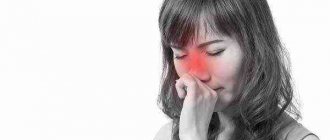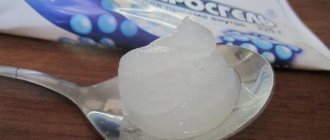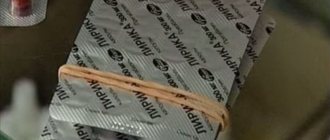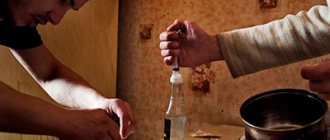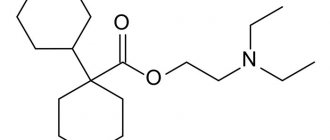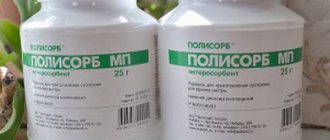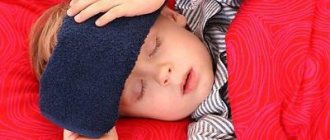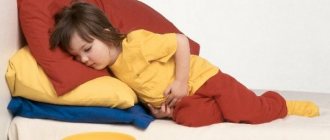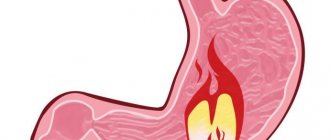Drug Naphthyzin
The drug Naphthyzin has become widespread in Russia, so Naphthyzin poisoning in children and uncontrolled use of the drug are common phenomena. The drug is not included in the list of necessary and vital means of the Ministry of Health, as a result of which the medicine is sold without a prescription. However, the risk of poisoning and death in children is very high. Most adults and children use the drug without medical supervision, and many suffer from naphthyzine addiction or acute drug poisoning reactions.
Therapeutic effect of Naphthyzin
Naphthyzin is widely in demand due to its low cost - the price for 5 ml of solution rarely exceeds 20 rubles. It eliminates nasal congestion 5-10 minutes after instillation, and the resulting effect lasts for 6 hours or more. This happens due to the ability of the active substance - naphazoline - to stimulate alpha2-adrenergic receptors.
As a result of this effect, specific signs of rhinitis disappear:
- burning, tickling and scratching in the nasal cavity;
- feeling of lack of air when inhaling;
- separation of liquid or thick secretion.
Naphthyzin stops inflammatory processes, eliminates swelling, irritation and redness of the mucous membranes. It is relatively well tolerated and provokes negative reactions from the body, usually when the dosage regimen is violated. But the appearance of side effects from Naphthyzin is often diagnosed in clinical practice. This is swelling of the nasal mucosa, atrophic rhinitis, attacks of nausea, arrhythmia, dizziness, increased blood pressure, drowsiness.
Info! Another area of application of Naphthyzin is the treatment of inflammatory and infectious eye diseases. This method of using the solution can also cause overdose and poisoning.
Composition of the drug and action
Naphthyzine for children is produced in concentrations of 0.1% and 0.05%. The drug improves blood circulation in the mucous membrane, reduces swelling, restores the patency of the nasal passages, and reduces the amount of secretory mucus. The drug contains one active ingredient called naphazoline. Per 1 ml of solution there is 1 mg or 0.5 mg of the active component.
The excipients of Naphthyzin are boric acid and purified water. The drug belongs to the group of alpha andrenostimulants.
Causes of Naphthyzin poisoning
An interesting fact is that the drug not only treats a runny nose, but also causes its development.
We are talking about drug-induced rhinitis, which develops due to long-term use of Naphthyzin and nasal drops with xylometazoline (Galazolin, Xymelin). If you use them for more than a week, the body stops fighting the disease on its own. Now you need to constantly use drops up to 10-15 times a day in order not to suffer from nasal congestion. The concentration of naphazoline increases significantly - Naphthyzine poisoning occurs. Drug-induced rhinitis is difficult to treat, especially in severe form . The patient has forgotten how to breathe without Naphthyzin and experiences physical and psychological discomfort. The active ingredient accumulates in the body, significantly worsening a person’s well-being, causing poisoning.
Due to improper use
The apparent harmlessness of the drug often becomes the cause of poisoning. A sick person does not go to see a doctor, but to a pharmacy. Having chosen Naphthyzin, he does not read the instructions, but immediately instills the solution into his nose. Often the patient repeats this 5-7 times a day, which is a dangerous violation of the dosage regimen. The instructions for use recommend administering the drug into each nasal passage for adults - 1-3 drops 3-4 times a day.
After 2-3 days of exceeding the dose, the first signs of poisoning may appear.
Causes of an overdose of nasal drops also include:
- device of a plastic bottle - instillation is done by pressing on its base. Without calculating the force, a person injects 2-3 times more solution into the nasal passage than recommended in the instructions;
- subjectivity of sensations - a person feels that the medicine does not help for a long time, and he uses it again. Even with severe rhinitis, swelling of the mucous membrane disappears after 15-20 minutes;
- using expired Naphthyzin - the nasal remedy loses its medicinal properties. Toxic chemical compounds are formed that are dangerous to the human body.
An unexpected and negative effect of treatment occurs in the presence of contraindications that the patient was not previously familiar with. This list includes hypertension, hyperthyroidism, severe atherosclerosis, and tachycardia.
Due to ingestion
Domestic manufacturers produce the drug packaged in plastic or glass bottles. Their volume is small (10-15 ml), so it is almost impossible for an adult to accidentally take the solution. This usually happens to children or people suffering from mental disorders. An overdose of Naphthyzin in this case develops after 20-30 minutes.
Poisoning in children
Using drops without a doctor's prescription is a common cause of overdose in children. Many parents do not know that in the treatment of a child under 6 years of age, the use of a standard 0.1% solution is strictly prohibited . Naphthyzine poisoning in children occurs faster than in adults, due to the anatomical features of the structure of the upper respiratory tract.
In a child, the blood vessels in the nasal sinuses are located close to the surface of the mucous membrane. Therefore, instillation of a concentrated solution will lead to an increase in the concentration of the active substance in the systemic circulation. In pediatrics, mainly 0.05% drops are used.
Side effects
The instructions for use of children's Naphthyzin indicate the following side effects:
- irritation of the mucous membrane at the site of action of the drug;
- atrophic rhinitis;
- swelling of the nasal mucosa;
- hyperemia;
- abnormal pulse and heart rhythm;
- increased blood pressure;
- headache.
If you do not exceed the permissible doses and do not give drops to children who have contraindications, then side effects can be avoided. If the first symptoms of drug poisoning occur, you should call a doctor.
Symptoms of Naphthyzin poisoning
If you take Naphthyzin, the consequences can be extremely severe, even leading to coma. It all depends on the individual characteristics of the human body. In case of hypersensitivity to the ingredients, systemic allergic reactions develop: anaphylactic shock, Quincke's edema.
Symptoms of Naphthyzin overdose when applied topically are varied:
- a rise in blood pressure with its subsequent decrease to values dangerous to health and life;
- attacks of nausea, often ending in vomiting;
- headaches similar to migraine;
- decreased heart rate;
- pain in the epigastric region and lower abdomen.
The psycho-emotional state of a person also changes. He becomes whiny, irritable, apathetic. His mood changes due to a lack of understanding of what is happening. When using drops in high doses, there is constant drowsiness.
Symptoms of a chronic overdose of Naphthyzin also include atrophic changes in the nasal mucosa, which develop gradually.
Contraindications
Naphthyzine is contraindicated for infants under one year of age
According to the instructions, the drug cannot be used to alleviate the condition of patients who have increased sensitivity to naphazoline. Contraindications for use are high blood pressure, thyrotoxicosis and atherosclerosis. If the runny nose has progressed to a protracted - chronic stage, it is advisable not to use Naphthyzin, since addiction and overdose may occur due to prolonged use. As a result, a person will become dependent on the drug or become poisoned.
This medicine is not compatible with antidepressants. Therefore, a patient taking such drugs or who has recently stopped taking them should not be treated with naphthyzine for a runny nose. The fact is that naphazoline, when reacting with MAO inhibitors, can enhance their effect and put the patient’s health and life at significant risk, leading to unforeseen serious consequences. The harm of drops for a runny nose in this case can significantly exceed the benefits of their use.
Naphthyzin therapy is contraindicated in infants under one year of age, lactating women and pregnant women.
Naphthyzin is contraindicated during pregnancy
A child’s body can come under the strong influence of a drug, which can cause side effects, including poisoning. Pregnant women should not take this medicine because its effect on this group of patients has not been studied. A version has been put forward that the vasoconstrictor effect of the drug can manifest itself in a similar way in relation to the placenta, and this can cause hypoxia. In addition, due to Naphthyzin’s ability to increase blood pressure and provoke attacks of tachycardia, this several times increases the risk of such a phenomenon occurring in this group of patients.
When breastfeeding, the active substance of the medicine can enter the baby’s body along with mother’s milk and have a negative effect on the child’s still fragile body.
Degrees of Naphthyzin overdose
When determining therapeutic tactics in case of poisoning with a vasoconstrictor, the doctor takes into account the severity of the victim’s condition.
In clinical medicine, there are three degrees of Naphthyzin overdose:
- first. The person complains of weakness, drowsiness, dry nose and sore throat, and lack of appetite. All symptoms are reversible and disappear without a trace after discontinuation of the drug;
- second. Poisoning is manifested by nausea, shortness of breath, local allergic reactions, including urticaria. Symptomatic treatment is carried out at home;
- third. There is a systemic allergy, clouding of consciousness, tremors of the arms and legs, and breathing problems. In such cases, saving the life of the victim is possible only in the intensive care unit.
Treatment of overdose in children and pregnant women is carried out somewhat differently. They will definitely be taken to a hospital facility. In the hospital, their condition is constantly monitored by doctors and junior medical staff.
Lethal dose of Naphthyzin
The drug is not used in the treatment of rhinitis in children under one year of age. In a child under 12 months, even one drop of a 0.1% solution can cause respiratory arrest. The life-threatening dose for an adult is 150 mg. This amount is contained in approximately a small 200 ml bottle. For children in the first two years of life, 10 mg of Naphthyzin is considered a lethal dose.
Naphthyzin should be stored in a dark place at room temperature. Young children's access to it must be limited.
Indications
As the instructions indicate, “Naphthyzin” is prescribed for the treatment of the following diseases and conditions:
- Rhinitis in acute or chronic form.
- Acute or chronic form of sinusitis.
- Eustachitis in acute form.
- Laryngitis of any type.
- During rhinoscopy as a means to facilitate the procedure.
- Swelling of the upper respiratory tract or larynx, which occurs due to inflammation or an allergic reaction.
- Hyperemia and inflammation in the mucous membranes of the nose as a consequence of surgery on the nasopharynx.
From what age can Naphthyzin be taken? In the field of pediatrics, the medication is used with extreme caution, due to the large number of side effects. It is prescribed to children as a remedy for eliminating nosebleeds, as well as for exacerbation of the runny nose and inflammation in the paranasal sinuses.
In addition to the main areas of use, the drug is used in ophthalmology. It is prescribed as part of complex therapy for conjunctivitis of bacterial origin in a chronic form, as well as asthenolic disorders.
View gallery
First aid for Naphthyzin poisoning
If a child or adult drinks Naphthyzin, it is necessary to perform gastric lavage. Give the victim warm water, and then press on the root of the tongue with your fingers or a spoon, inducing vomiting. It is strictly forbidden to wash the stomach of a person who is unconscious. (vomiting will cause dangerous breathing problems).
What else can you do to provide first aid:
- lay the victim down, calm him down, cover him with a blanket;
- monitor your condition by measuring your pulse and blood pressure every half hour;
- give him sweet hot tea;
- Give any enterosorbent from your home medicine cabinet - activated carbon, Polyphepan, Polysorb, Smecta, Enterosgel.
But all these activities should be carried out only after calling the ambulance team. The doctor will assess the condition of the victim, prescribe treatment or hospitalize him.
Analogues of the drug
If Naphthyzin is not suitable for the child or does not give the desired effect, doctors advise replacing it with more gentle drugs. Analogues of these drops are “Sanorin” and “Naphazoline Ferein”, which also contain the active ingredient naphazoline.
If for some reason Naphthyzin is contraindicated for a child, and there is swelling in the respiratory organ, doctors recommend other drugs. These include :
- "Nazol" spray;
- "Snoop";
- "Sanorinchik";
- drops "Dlyanos";
- "Aqualor baby"
If you need direct vasoconstrictor drops, you can use Vibrocil and Otrivin. These drugs are milder and suitable for children.
Before replacing Naphthyzin, consult your doctor. Self-medication can be dangerous for the child’s body.
Before using the medicine, you must consult a doctor. To the question “Can children have Naphthyzin?” - Doctors do not give a definite answer. But in some cases the drug may be irreplaceable. Its use for a child must be supervised by parents.
Author: Khatuna Gabelia, pediatrician, especially for lechim-gorlo.ru
Treatment of poisoning with Naphthyzin drops
Treatment of Naphthyzin poisoning begins immediately after diagnosis. When choosing medications, the doctor is guided by the age of the victim, the severity of symptoms, and the presence of chronic diseases.
There is no antidote for Naphthyzin poisoning . The following medicines may be used:
- if there is a sharp jump in blood pressure, antihypertensive drugs in the form of tablets or injections are indicated (Enap, Dibazol, Furosemide, etc.);
- to relieve bradycardia, intravenous administration of Atropine sulfate or Dopamine is practiced;
- The universal antidote for any food poisoning is activated charcoal. But recently, preference has been given to enterosorbents in the form of a suspension, for example, Enterosgel.
After normalization of the condition of the adult or child, maintenance therapy is carried out. To restore water and electrolyte balance, Regidron, Gidrovit are used, and to strengthen the body's defenses, balanced complexes of minerals and vitamins (Centrum, Vitrum, Supradin) are used.
Treatment in hospital
A child who has been poisoned will have their blood taken for biochemistry to determine the concentration of the solution in the blood and the degree of poisoning. Be sure to monitor the heart rate of a small patient. Infusion therapy is used. You need to know that Naphthyzin should not be used for more than 5 days, and the medication should be alternated with other drugs (Pinosol, Aquamaris).
Treatment involves the use of antidotes (for example, atropine sulfate) to eliminate the effects of chemical poisoning. The doctor will develop a regimen for using the medications. In case of mild poisoning, it is possible to use absorbent gels and solutions (“Enterosgel”, “Polysorb”).
Prevention and possible complications of overdose
With prompt first aid and proper treatment, the consequences of poisoning are not observed. The active ingredient is excreted from the body by being converted in the liver.
Complications develop with acute intoxication, which provokes a deterioration in heart function. In the future, the risk of heart attacks, strokes, and angina increases.
The best prevention of poisoning with nasal drops is their use as prescribed by a doctor in the dosage regimen specified by him. It is forbidden to increase the recommended dose of the drug or use it for longer than 7 days. Naphthyzin should be stored in places inaccessible to small children and people with unstable mental health. If all recommendations are followed, the risk of overdose tends to zero.
Reviews
All drugs containing naphazoline are highly addictive. However, this does not prevent them from enjoying great popularity both among patients and among specialists. "Naphthyzin" is a time-tested drug. It quickly and effectively relieves swelling and restores respiratory function.
At the same time, the drug is one of the most affordable among similar ones in price. Quite often it is purchased and used without a doctor’s prescription, which ultimately leads to undesirable consequences. Experts do not recommend doing this, since the drug is potent and the dosage must be selected individually.
View gallery
For children, the drug is prescribed in cases where other options have already been tried and have not yielded results in treating a runny nose. The most popular analogue of Naphthyzin is Sanorin. Emulsion with eucalyptus oil, among other things, has an anti-inflammatory effect.

